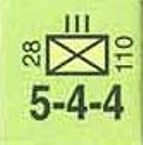ralphtricky
Posts: 6685
Joined: 7/27/2003
From: Colorado Springs
Status: offline

|
quote:
ORIGINAL: Uncle_Joe
quote:
rather than say it's your PREFERENCE that air be modelled more powerfully, you argue that the engine is "broke".
I say is 'broke' because the power already exists, just not in the hands of the player. In a GAME is that really the best way to handle it? This has NOTHING in the world to do with airpower in the 'real world' anymore. Its simply the way the game handles it that I dont care for...AI controlled airpower (ie, random interdiction strikes) work fine (and some say too well), but player designated strikes accomplish next to nothing.
My original complaint still stands...why are BOMBARDMENT ATTACKS (especially using airpower) so weak vis a vis computer initiated INTERDICTION ATTACKS (which appear to be quite effective and even dont seem to suffer losses like the Bombardments).
So, once more, for the record...Air power AS A WHOLE seems OK in its effects....this is largely because Interdiction IS effective. Bombardment by air is completely ineffective, even when called in on the SAME target status (ie, mobile and moving along a road or clear area). I contend that the disparity should not be anywhere NEAR this great.
But nowhere in the above does it matter what REAL WORLD air power can or cannot do...I just want one part of the engine (ie, the player controlled) to be consistant with the other part (ie, the random AI controlled).
Is that such a bad thing for a game that the PLAYER is supposed to be playing?
Just to set the record straight here. Elmer (the AI) plays by the same rules you do. He does have a slight advantage in proficiency, but that's it. Other than that, as far as I can tell, he plays in the same 'universe' that you do. Other than that, as far as I can tell, he plays in the same 'universe' that you do.
The game mechanics may make a distinction between interdiction and combat support, I haven't checked, but what I'm hearing is that there is a difference.
There are two very good reason that interdication and bombardment are of different stengths. I'll be more than happy to debate the first, but I think that resources for this are going to be hard to find.
I see interdiction attacks as being attacks of opportunity determined by intelligence or other factors, that are against moving vehicles/equipment. Bombardments are attacks against an opponent that has had a couple of hours to prepare, and is spread out and ready to mount a defense. Yes, they are going to be different, but see the flat earth discussions about 'obvious' things. If anyone has any references that prove that attacks against static postions are going to be as effective or more effective than attacks against movung units, or if you have other ideas on what these are an abstraction for, I'd be glad to hear what they are.
The other reason is a bit more pragmatic. If they were the same strength, why the heck would anyone EVER use interdiction? I'm sorry, either attack a random unit, probably a decoy, or help an existing attack... If you can sicerely pick A, I'd really like to play you PBEM.
I'm not saying that there may not be problems with the Air modeling, or that it may not be changed in the future. I can easily believe that some of the abstractions that apply for WWII don't apply in modern warfare, although the data posted from the Gulf war seem to indicate that they aren't as changed as one would think. See again, the Flat Earth references
Ralph Trickey
TOAW III Programmer
_____________________________
Ralph Trickey TOAW IV Programmer Blog: http://operationalwarfare.com --- My comments are my own, and do not represent the views of any other person or entity. Nothing that I say should be construed in any way as a promise of anything. |
 Printable Version
Printable Version












 Other than that, as far as I can tell, he plays in the same 'universe' that you do.
Other than that, as far as I can tell, he plays in the same 'universe' that you do. 





 New Messages
New Messages No New Messages
No New Messages Hot Topic w/ New Messages
Hot Topic w/ New Messages Hot Topic w/o New Messages
Hot Topic w/o New Messages Locked w/ New Messages
Locked w/ New Messages Locked w/o New Messages
Locked w/o New Messages Post New Thread
Post New Thread